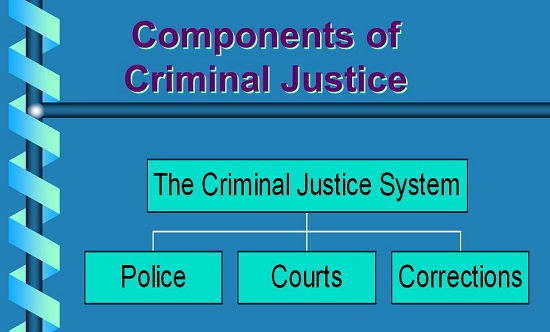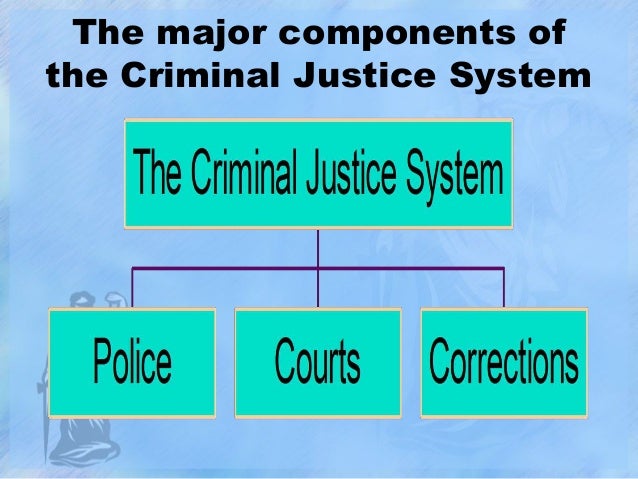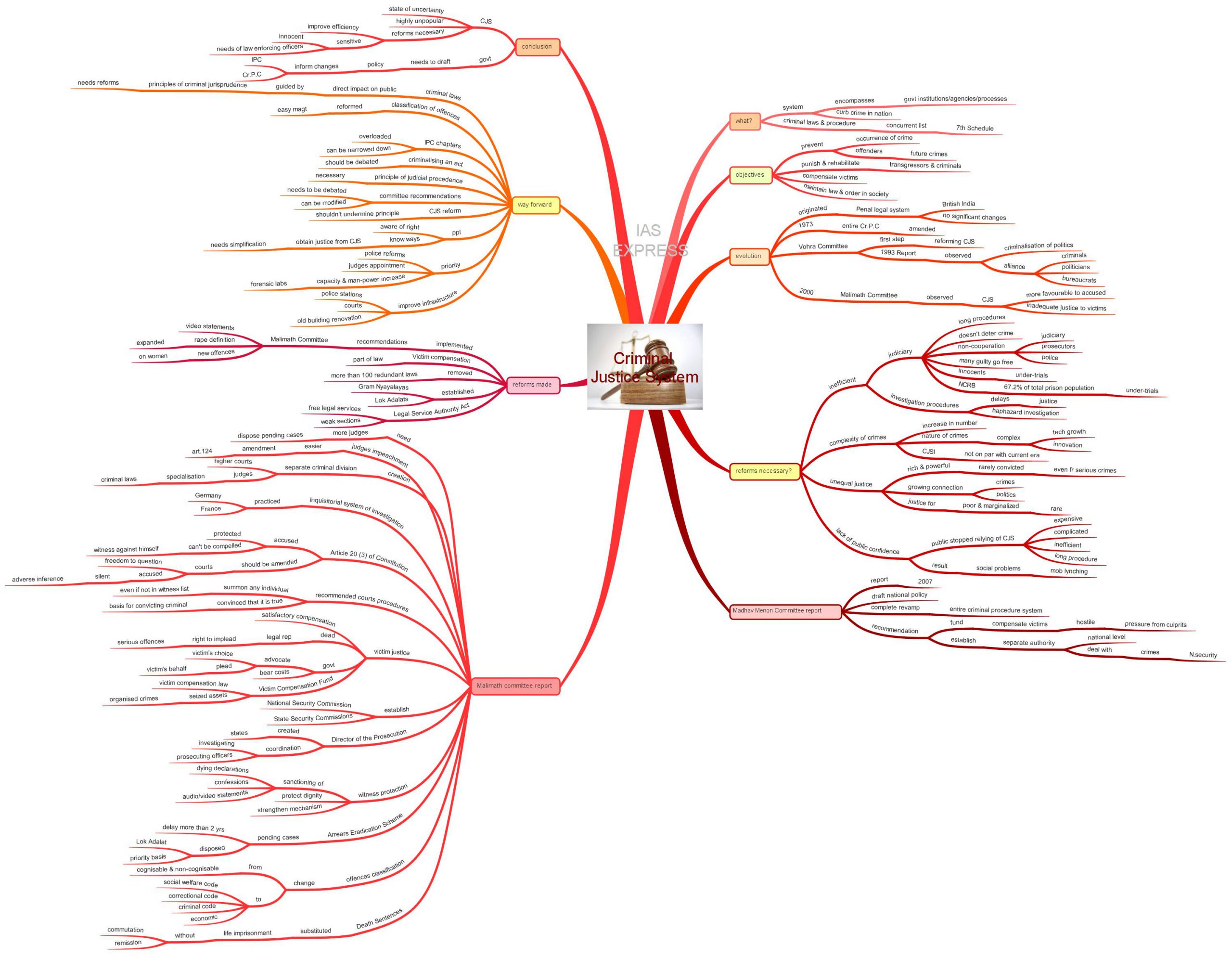Criminal Justice System in India: Need for Reforms

The Home Minister had recently said that the Bureau of Police Research and Development should work on a proposal to amend various sections of the Indian Penal Code and the Code of Criminal Procedure. This comes in response to the growing inefficiency of India’s Criminal Justice system. India’s criminal justice mechanism suffers from a lack of judiciary’s accountability and non-cooperation between its investigation and prosecution wings, allowing criminals to go scot-free. Even if they are charged, they manage to wriggle out either due to botchy investigation or apathetic prosecution. India’s Criminal Justice System is dismal as its conviction rate is just 21.2% of the cognisable offences. On the other hand, countries like the US and Japan have a conviction rate of over 98%. Clearly, reforms in India’s criminal justice system are a need of the hour.
This topic of “Criminal Justice System in India: Need for Reforms” is important from the perspective of the UPSC IAS Examination, which falls under General Studies Portion.
What is the criminal justice system?
- The Criminal Justice System (CJS) encompasses a series of institutions, agencies, and processes established by the government to curb crime in the nation. It includes police, courts and other law enforcement agencies.
- The criminal laws and criminal procedure are in the concurrent list of the 7th Schedule of the Indian constitution.

What are the objectives?
- To prevent the occurrence of crime
- To punish the transgressors and criminals
- To rehabilitate the transgressors and the criminals
- To compensate the victims as far as possible
- To maintain law and order in society
- To deter offenders from committing any crimes in the future
How did it come to be?
- The Criminal Justice System in India has its origins in the Penal legal system that came to be during the era of British India.
- The system hasn’t undergone any significant changes until now.
- For example, Section 124A of the Indian Penal Code that defines sedition was enacted during the British rule still exists.
- The entire Code of Criminal Procedure (Cr.P.C) was amended in 1973.
- Vohra committee was the first step towards reforming India’s CJS. Vohra Committee report of 1993 observed that the aspects of criminalisation of politics and alliance among criminals, politicians, and bureaucrats in India.
- In the year 2000, the Indian government established a panel headed by Justice V.S Malimath, the former Chief Justice of Karnataka and Kerala, to find ways to reform the old CJS.
- The Malimath Committee observed that the existing CJS “weighed in favour of the accused and did not adequately focus on the justice to the victims of the crime.
Why is there a need for change?
- Underproductive: The criminal laws are out-dated. This has led to harassment of the innocent civilians by the government agencies and very high pressure on the judiciary to dispose-off the cases with limited and redundant laws.
- The inefficiency of Judiciary: The system takes years to bring justice and has ceased to deter criminals. Furthermore, there is no cooperation between the judiciary, prosecutors and the police. Many of the guilty go scot-free while the innocent remain on under-trial. According to the NCRB data, about 67.2% of the total prison population consists of under-trail prisoners.
- The complexity of crime: The number of crimes has increased rapidly in recent times and the nature of crimes is also increasingly becoming more complex due to technological growth and innovation. India’s criminal justice system is not encompassing the new era’s novel crimes.
- Inefficient investigation procedures have led to a haphazard investigation of crimes and delayed justice
- Inequality of justice: The rich and the powerful are hardly convicted even for serious crimes. The ever-growing connection between politics and crimes is making justice of the poor and the marginalised society highly difficult.
- Lack of public confidence: In the current times, the civilians have stopped relying on the CJS as it is expensive, complicated, inefficient and has long-winded procedures. This has led to current social problems like mob lynching.
What did the Malimath committee report say?
Some of the important recommendations of the Malimath committee are as follows:
- Need for more judges to dispose-off a large number of pending cases.
- Constitution of a National Judicial Commission to deal with the appointment of judges to the higher courts and amendment of Article 124 to make impeachment of judges.
- Creation of separate criminal division in higher courts that have judges specialising in criminal laws.
- Inquisitorial system of investigation as per the practices in Germany and France can be implemented in India.
- The Courts must be given the power to summon any individual even if he is not listed as a witness.
- Article 20 (3) of the Constitution, that protects the accused from being compelled to be the witness against himself/herself, needs to be modified. The courts should be given freedom to question the accused to give information and draw an adverse inference against the accused in case the latter refuses to answer.
- Indian courts follow “proof beyond a reasonable doubt” as the basis to convict an accused in criminal cases. This has created an unreasonable burden on the prosecution. Thus the committee recommended “if the court is convinced that it is true” as the basis for convicting a criminal.
- Justice to victims: The victims must be given satisfactory compensation. If the victim is dead, then the legal representative should have the right to implead himself/herself as a party, in case of serious offences. Additionally, the government should deliver an advocate of the victim’s choice to plead on his/her behalf and the cost should be borne by the government if the victim can’t afford it.
- Victim Compensation Fund should be created under the victim compensation law and the assets confiscated from organised crimes should be made a part of it.
- Steps must be taken to establish a National Security Commission and State Security Commissions.
- Director of the Prosecution should be created in every State to enable coordination between the investigating and prosecuting officers.
- Witness protection: The dying declarations, confessions, audio/video statements of the witnesses should be sanctioned by law. The dignity of the witnesses should be ensured and there should be a strong witness protection mechanism to safeguard them from all possible threats
- Arrears Eradication Scheme should be enacted to settle cases that are pending more than 2 years through Lok Adalat on a priority basis.
- Classification of offences should be changed to the social welfare code, correctional code, criminal code and economic and other offences code instead of the current cognisable and non-cognisable.
- Death Sentences should be substituted with imprisonment for life without commutation or remission.
What did the Madhav Menon Committee report say?
- Menon Committee on criminal justice reforms submitted its report in 2007.
- It was established to draft a national policy paper on the criminal justice system.
- It called for a complete overhaul of the entire criminal procedure system.
- It had proposed the creation of a fund to compensate victims who turn hostile due to the pressure from culprits.
- It advocated for the establishment of separate authority at the national level to deal with crimes that threaten India’s national security.
What are the reforms made by the Indian government?
- The government has implemented several recommendations made by the Malimath Committee report like permitting videography of the statements, definition of rape has been expanded and new offences against women have been included.
- Victim compensation is currently a part of the law.
- Furthermore, the government has removed more than 100 redundant laws that limited smooth administration.
- The Gram Nyayalayas and Lok Adalats were established to provide citizens that access to justice at their doorsteps.
- Legal Service Authority Act was enacted by the Parliament to provide free and skilled legal service to the weaker section of the society.
What can be the way forward?
- Criminal laws have a direct impact on the public.
- Therefore, the inclusion of new offences and withdrawal of the existing classification of offences should be guided by the principles of criminal jurisprudence.
- The classification of offences should be reformed in a way that the management of crimes and criminal laws are easier in the future.
- Many of the chapters of the Indian Penal Code are overloaded and ambiguous. The chapters on offences against public servants, contempt of authority, public tranquillity and trespass can be redefined and narrowed down.
- Guiding Principles of the Criminal Justice System needs reform and it can be done based on proactive debates.
- Also, an all-encompassing debate is necessary before criminalising an act, failing which can lead to the creation of new offences and arbitrariness in the criminal justice system.
- The freedom of the judges to decide the quantum and nature of the sentence differently for the crimes of the same nature must be based on the principle of judicial precedence.
- The government may also revisit the committees’ recommendations though with cautious debates.
- The Malimath Committee has suggested 158 changes of CJSI and not all recommendations were implemented by the government.
- Its recommendations like dilution of the standard of proof or considering the confession of a senior police officer as evidence are not realistic.
- Thus, these recommendations can be made use of with certain modifications based on debates and recommendations by those from all walks of life.
- Reforming of the CJS does not mean the undermining of the founding principles of India’s justice system.
- The people should be made aware of their rights and the ways through which they can obtain justice from CJS.
- Public trust should be obtained by the government through media, surveys, interactions, awareness etc.
- Criminal Justice System procedures should be further simplified so that they can be understood by all.
- Priority should be given to police reforms, the appointment of judges, including new scientific methods to solve crimes, improving capacity and man-power in forensic labs, etc.
- Improvement of related infrastructures like an increase in the number of police stations and courts at the rural level, renovation of old buildings etc., should also be prioritized.
Conclusion:
Criminal Justice System in India is currently in a state of uncertainty and is highly unpopular due to its inefficiency. Clearly, the reforms in India’s Criminal Justice System are a need of the hour. The government needs to draft a clear policy that can inform changes in the Indian Penal Code and Code of Criminal Procedures. The reforms should not only make CJSI more efficient but also be sensitive to both the innocent and the needs of the law enforcing officers.


Where the mind map…sir
Uploaded.